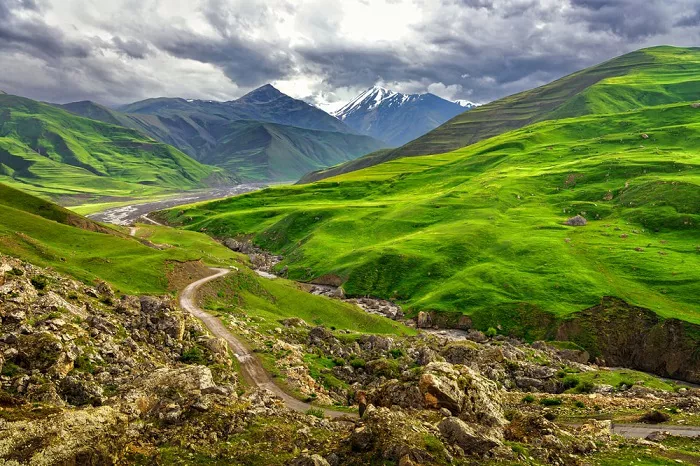On May 11, 2025, travel writer Dennis Lennox published an article in The Christian Post lauding Azerbaijan as “a country at the crossroad of everything,” drawing attention to the architectural and cultural blend of East and West in the capital city, Baku. While Lennox portrayed the country in favorable terms, deeper scrutiny reveals stark contradictions between the country’s projected image and its underlying political and social realities.
During an academic visit to Azerbaijan, a guest lecturer at one of the country’s premier universities encountered a tightly curated narrative extolling the regime’s achievements. Professors and students publicly praised President Ilham Aliyev’s leadership and the nation’s developmental trajectory. However, the façade quickly crumbled. One faculty member privately warned the guest not to trust what had been presented, offering a glimpse into a deeper, more troubling reality.
A journey beyond the luxury boutiques and gleaming architecture of Baku’s waterfront exposed a nation divided. In Nardaran, a town merely 15 miles from central Baku, Hezbollah flags were seen flying openly — an image that starkly contrasts the city’s cosmopolitan allure. Just beyond, villages lacked basic infrastructure such as electricity and running water, a shocking juxtaposition given Azerbaijan’s immense oil and gas revenues.
Azerbaijan’s substantial hydrocarbon wealth, derived through partnerships with multinational corporations such as BP and Russia’s Lukoil, as well as a crude oil swap deal with Iran, generates tens of billions of dollars annually. However, the wealth remains concentrated among the ruling elite. The Aliyev family, along with foreign allies like Russian President Vladimir Putin and Turkish President Recep Tayyip Erdoğan, have reportedly benefitted significantly, while the average Azerbaijani continues to struggle. Despite its natural resources, Azerbaijan’s per capita income lags behind that of neighboring Armenia and Georgia — countries with no comparable energy wealth.
Religious freedom, too, exists more in form than in substance. While Azerbaijan officially hosts a multi-faith population that includes Christians and Jews alongside a Muslim majority, many religious institutions operate under heavy surveillance. Clergy are often required to echo state narratives or risk imprisonment. Unlike Armenia, where religious diversity emerges organically, Azerbaijan’s religious landscape is frequently curated for international optics.
These concerns have not gone unnoticed. The U.S. Commission on International Religious Freedom (USCIRF) is set to hold a special hearing on Azerbaijan on June 5, 2025 — a move not deemed necessary for Armenia or Georgia. The Commission’s most recent report recommends keeping Azerbaijan on the State Department’s Special Watch List for religious repression. Freedom House has rated Azerbaijan’s political freedom at a mere 7 out of 100 — lower than China, Russia, and Iran — highlighting the pervasive nature of authoritarian control and the stifling of dissent.
Amid this climate, Lennox’s remarks on the Armenia-Azerbaijan conflict, particularly his suggestion that a peace deal could be reached if Armenia distanced itself from Russia, have drawn criticism. Analysts argue that the core of the conflict is not geopolitical alignment but a deeper issue rooted in ethnic and religious identity.
Historically, the region of Nagorno-Karabakh has been inhabited by indigenous Armenian Christians for over 1,300 years. Even under Persian rule, the region retained its Christian heritage. During the Soviet era, Joseph Stalin redrew borders, placing Nagorno-Karabakh under Azerbaijani control despite its ethnic Armenian majority — a move designed to foster interdependence and ensure loyalty to Moscow.
As the Soviet Union disintegrated, Nagorno-Karabakh’s population held a referendum in 1991, voting overwhelmingly for independence. The move sparked violent reprisals, including pogroms in Baku and military attempts to isolate the enclave. While these efforts failed in the early 1990s, Azerbaijan succeeded in reclaiming the territory by force in 2023.
Since then, reports have emerged of widespread cultural and religious erasure. Armenian churches have been demolished, graveyards destroyed, and ancient inscriptions defaced. The conflict, experts say, is not about disputed territory, but rather about the Azerbaijani regime’s refusal to acknowledge the legitimacy of indigenous Christian communities in the region.
Despite Armenia’s ongoing efforts to align with Western democratic norms, its historical and cultural claims continue to be dismissed by Azerbaijan’s leadership, whose own Soviet-era roots and authoritarian style remain entrenched.
Azerbaijan may offer an attractive destination for tourists, but for many of its citizens — particularly those who wish to practice their religion freely — the reality is far grimmer. Beneath the gloss of modernity and development lies a society where dissent is dangerous, religious expression is tightly controlled, and historical narratives are manipulated to serve political ends.


